- Home
- Beverly Barton
The Rebel's Return Page 3
The Rebel's Return Read online
Page 3
Nadine stood on wobbly legs and made a valiant—if somewhat overly dramatic—effort to walk toward the door. Halfway there, she stumbled. Maddie rushed to her mother’s side, slid her arm around Nadine’s waist and sighed deeply.
“Let me drive you home,” Maddie said. “A nice, long drive in the fresh air will be good for both of us.”
“Yes, dear, that would be lovely.” Nadine patted Maddie’s cheek. “You can be such a good daughter…when you want to be.”
Maddie sat her mother back on the sofa until she could clear off her desk and retrieve her handbag. On the way out, she instructed Alicia to forward any important calls to her cell phone and take messages about anything that could be handled tomorrow.
Ten minutes later, with Nadine secured by the seat belt in Maddie’s white Mercedes-Benz convertible, they headed down Gulf Road, past County General Hospital. With wind humming around her, her hair flying like a bright red flag, Maddie shut out the sound of her mother’s droning whine. Complain, complain, complain. Was there never any end to it? Why couldn’t her mother be content? Sometimes Nadine didn’t care that no one responded to her incessant chatter; all she seemed to require was an audience to listen.
Still tuned out to everything except her private thoughts about the upcoming gala at the club, Maddie whipped the convertible off the road and into her mother’s private drive. After their divorce, Jock had generously given Nadine the home they had shared for nearly twenty years, and Maddie now paid for the upkeep as her father had once done. The palatial Georgian sat on twenty acres, all immaculately groomed.
Maddie parked, helped Nadine from the car and to the front door. Instead of bothering with trying to unlock the door, she simply rang the bell. Ernesta Sanchez, her mother’s longtime housekeeper, opened the door.
“Oh, my, Señora Delarue, are you all right?” The short, squat Ernesta’s concern was genuine. Maddie knew, even though her mother would never admit being fond of a servant, that Ernesta was probably her mother’s best friend.
“Mother’s had a busy day.” Maddie escorted Nadine past Ernesta and into the huge marble-floored foyer. “She had lunch with the girls at the club.” Maddie and Ernesta exchanged so-she-had-too-much-to-drink glances. “I’ll have one of the valets bring her car home later. She didn’t feel quite up to driving herself.”
“Let me help you.” Ernesta took Nadine over completely, her big arm securely circling her employer’s waist. “What you need is a nice, long afternoon nap.”
“Yes, you’re probably right,” Nadine said, smiling forlornly at her housekeeper. “I am a bit tired.” Nadine glanced at Maddie. “Do you mind terribly, dear? I’m sure you’d hoped we could spend the afternoon together. But I’m afraid I suddenly have a horrific headache.”
“I don’t mind,” Maddie said. “Let Ernesta help you up to your room. I’ll run along, but I’ll phone later this evening to check on you.”
“Yes, do that. Please. I do so look forward to your calls.” Nadine allowed Ernesta to lead her toward the massive staircase. “You should phone more often. I get terribly lonely.”
“I promise that I’ll do better in the future.”
While Nadine leaned on Ernesta as the two walked up the stairs, Maddie let herself out and rushed to her car. She sat behind the wheel for a couple of minutes, contemplating her mother’s life and their relationship. She had been trying—unsuccessfully—for the past ten years to get her mother to see a psychiatrist, to seek professional help for her depression, but Nadine adamantly refused.
“I’m perfectly sane,” she’d said. “As sane as any woman could be whose husband humiliated her in front of the whole world. The man promised to love and honor me, to be faithful to me until death. Whatever you do, Maddie, never trust any man. They’re all alike. They’ll break your heart.”
Snap out of it, Maddie told herself. If you let yourself, you could wallow so deeply in your mother’s self-pity that you might wind up drowning in it the way she has.
Twenty minutes later, Maddie parked in the garage in the basement of her condo. After college, her mother had insisted she move home with her, but Maddie had struck a blow for independence then and there. And she’d never regretted having moved into the condo and separating herself from her mother. If she hadn’t done that, she doubted she would have survived without psychiatric help of her own.
As she unlocked the door of her three-thousand-square-foot, two-story home, she heard music playing. That could mean only one thing. Thelma was here. Thelma Hewitt was her personal maid, a five-foot-tall ball of fire, with gray-streaked, short black hair and keen brown eyes that saw straight through most people and especially Maddie. Highly efficient, but a notorious busybody, Thelma had worked for Maddie for twelve years. Maddie hadn’t wanted a live-in maid, having grown up with a house full of servants. Being a daily maid had suited Thelma just fine. After all, she needed time for her husband, five children and fifteen grandchildren.
After tossing her handbag and keys on the velvet Louis XIV chair in the foyer, Maddie followed the sound of the country-western music, which led her into the kitchen. There stood Thelma, singing along with an old Eddy Arnold tune, peeling apples and dropping the slices directly into an uncooked pie shell.
“You look busy,” Maddie said.
Thelma gasped, dropped her knife and the half-peeled apple onto the granite countertop. “Good Lord, gal, you scared the bejesus out of me!”
“Sorry, I thought you heard me walk in.”
Thelma wiped her hands on her apron, reached over to turn off the radio, then looked Maddie up and down. “What are you doing home at three o’clock?”
Maddie eased up and onto a stool at the bar area that ran behind the work center. “I had to drive Mother home from the club.”
Thelma raised her eyebrows. “How is Nadine?”
“The same.”
“Are you okay?”
“Sure, I’m fine.” Thelma was a mother-to-the-world type of woman and she’d been mothering Maddie since the first day she came to work for her. “I just wish there was something I could do for Mother, some way I could help her.”
“Nadine doesn’t want to be helped. She wants to be pitied. So you just go on pitying her and doing what you can. Can’t nobody help that woman but herself. You should be concentrating on your own life a bit more.”
“Is this the get-married-and-have-babies talk that we’ve had on numerous occasions?”
Thelma picked up the apple and the paring knife. “I know you modern girls think you don’t need a man to complete your life or kids of your own to give you a reason to live, but—”
“But you think I’m the kind of woman who needs to have a husband and children.” Maddie reached over and picked up an apple slice from inside the pie pan. “On that one subject, you and Mother agree totally.” Maddie popped the apple bite into her mouth.
“There’s a man out there waiting for you. You just haven’t found him yet.”
“There are dozens of men out there waiting for me,” Maddie said. “Probably hundreds, if not thousands. And they all want one thing—my money. You know the funny thing is that Mother wants me to get married and give her grandchildren, but at the same time she warns me to never trust any man. And you know what, Thelma? I don’t trust men. Not any of them.”
“Ah, but one of these days—”
“One of these days, what? Some daring man will sweep me off my feet, make mad, passionate love to me and not give a damn that I’m the richest woman in Texas?”
“Something like that.”
“You’re daydreaming.”
“Dreams are free, Maddie, my girl. If we don’t have our dreams, we don’t have anything. So what’s wrong with your dreaming about being swept off your feet by some handsome man?”
“The last time I got swept off my feet, I wound up at the police station. It seems my Romeo had stolen a car to impress me.”
“You’re talking about that Bridges boy…Dylan Bridges. That young
un sure was a boil on his daddy’s backside. Did everything and anything to rile the judge. I wonder whatever happened to him. Last time I saw him was right before he got sent off to Amarillo to that reform school. Lord, he was a sight, with that long hair and that earring. Looked like a damn hippie.”
Maddie hopped off the stool, opened the refrigerator, removed a bottle of Perrier and headed for the door. “I think I’ll get some work done in my study. Say goodbye before you leave, okay?”
“Sure thing. And I’ll bring you a piece of this pie, just as soon as I take it out of the oven.”
Maddie smiled, then escaped to her study, a small, cozy retreat, with floor-to-ceiling bookshelves on three sides and a wall of windows on the fourth. As she positioned herself in the oversized, navy-blue leather chair and placed her feet on the matching ottoman, she thought about Dylan Bridges. Over the years she’d thought of him from time to time, and always wondered what had happened to him. Rumors had abounded: he’d become everything from a mercenary to a priest. Which was highly unlikely because his family wasn’t Catholic.
Where was Dylan now? And what was he doing? He’d been one boy who hadn’t given a damn that her daddy was Jock Delarue. He’d liked her. Wanted her. She’d known that fact as surely as she’d ever known anything. If only Dylan had come into her life later, when she’d been more mature—when they’d both been adults.
If she met a guy like Dylan Bridges now, would she have the guts to reach out and grab him? Or would she let her doubts and insecurities about love, marriage and men in general stop her from taking a chance?
Maddie shrugged. What difference did it make what she might or might not do? She was about as likely to meet a man like Dylan Bridges as she was to sprout wings and fly.
Two
For just a split second Dylan felt as if he’d stepped back in time. Seventeen years. The old home looked the same, there on the big, level lot in the middle of town, only a few blocks from the courthouse. Did his father still walk to work every morning and then home again in the evenings? Probably. Carl Bridges was a creature of habit. If other things had changed about him, that probably hadn’t.
His father had inherited this 1920s Craftsman style house from his uncle, who’d died a bachelor. Like many of the homes of its day, the Bridges house possessed two stories, a sloping roof line, a large square front porch with a swing and a detached two-car garage. The white picket fence around the property boasted a fresh coat of paint, as did the house. Dylan wondered if his great-uncle’s old Packard was still parked inside the garage. As a teenager, he had longed to get behind the wheel of that antique gem, but his father had refused to let him even sit inside the car.
A large American flag, waving slightly in the wind, hung over the porch. His father, a Vietnam veteran, had been, in the best of times, a patriotic citizen, and no doubt he was now more so than ever. Looking back to his boyhood, Dylan could recall many reasons to have been proud of his dad. Why couldn’t he have realized it at the time?
As he stepped away from the cab and onto the walkway that led up to the front porch, Dylan experienced a moment of uncertainty. Standing at the front door, he hesitated before ringing the bell. Maybe he should have telephoned first to tell his father he was coming. Why the hell had he wanted his arrival to be a surprise?
Reminding himself that his father had been the one to call him, to extend the olive branch, to ask forgiveness, he punched the doorbell. Within seconds he heard footsteps inside the house, then the front door opened and there stood a broad-shouldered, stern-faced man of sixty, with a stock of neatly trimmed white hair and the same watery-blue eyes that Dylan remembered so well.
A sudden smile flashed across Carl Bridges’ face as he reached out to grab Dylan’s arm. “Come on in, son. Come on in.” Carl draped one arm around Dylan’s shoulders and escorted him into the house.
Dylan wasn’t sure what he had expected. A cordial handshake at most. But certainly not this warm, enthusiastic welcome. His father had never been an overly emotional man, and never one for displays of affection. The only hugs and kisses Dylan had gotten as a boy had come from his gentle, loving mother.
“I had no idea you would come home so soon,” Carl said as he led Dylan into living room. “I’d hoped you would want to see me as much I wanted to see you, but…” Carl cleared his throat.
Dylan stared at his dad, startled by the fact that the old man was almost in tears. This wasn’t the Carl Bridges he remembered. And this softer side of his father unnerved him. He had been prepared for both of them to feel and act a bit awkward, but it had never entered his mind that his father might have mellowed with age.
“Have you had supper?” Carl asked. “I could make us some sandwiches here at the house. Or if you’d like we could run over to the Mission Creek Café for some barbecue. Whatever you’d like.”
“Sandwiches here are fine with me, Dad.” Odd how easily he could say that word. Dad. And even more strange was how comfortable he felt in this house. The place had never felt more like home than it did at this very minute.
Dylan glanced around the living room and found fresh tan paint on the walls and a new sofa and chair. The same simple wood paneling around the fireplace and the sturdy coffee and end tables remained, but wooden shutters had replaced the heavy curtains and window shades.
“Come on back into the kitchen with me, son, and let’s talk.” Carl nodded the direction. “I’ll fix ham and cheese. That used to be your favorite.”
His dad actually remembered what his favorite sandwich had been. He would have sworn that his father hadn’t known a thing about him back then, certainly nothing as personal as his preferences in food. Guess it just went to show how wrong he’d probably been about other things, too.
“Yeah, it’s still my favorite.” Dylan followed his dad into the kitchen, a room that had changed even less than the living room. A new refrigerator seemed to be the only major difference. And the walls were now beige instead of the sunny yellow his mom had painted them.
“Sit down. Sit down.” Carl opened the fridge and began removing items, laying ham and various condiments on the table. “Tell me about yourself, Dylan. I know you live in Dallas and that you’re a stockbroker. That private detective I hired to find you told me that much.”
Dylan pulled out one of the wooden ladder-back chairs from the table and sat. “Why did you hire a private detective? Why didn’t you just use your local and state law enforcement connections?”
“You know me, boy, I go strictly by the book whenever possible. I call in favors only if I have no other choice.” Carl sliced several thick slabs of ham. “There are times when a man gets himself in a jam and he has to do whatever is necessary to get himself out of trouble.”
Staring at his father, Dylan wondered if he’d heard him right. “Are you in some sort of trouble? Is that why you asked me to come home? Do you need my help?”
Carl took a loaf of bread out of the cupboard, removed four pieces and placed them on two earthenware dinner plates. “I asked you to come home because I want a chance to get to know my grown son and—” Carl cleared his throat “—to make amends for past mistakes.”
“You weren’t the only one who made mistakes,” Dylan said. “I wasn’t blameless. I screwed up a lot, and most of the time it was on purpose. It seemed to be the only way I could get your attention.”
“I’m not making any excuses, but…well, I had a mighty difficult time after your mama died.” Carl spread mayonnaise and hot mustard on the bread, then stacked ham, cheese, lettuce, tomatoes and dill pickle slices before adding the top piece of bread. “I should have been a better father. I should have done something to help you after you stole that Porsche from the country club. I let my stupid pride keep me from doing what I really wanted to do. But at the time, I told myself I was doing the right thing, letting you learn your lesson the hard way.”
“That’s exactly what I did,” Dylan said. “I had to learn everything the hard way back then. Even when I
left the reform center, it took me a few more years to get on track and turn my life around.”
“You’ve done well, son, and I’m awfully proud of you.”
Dylan swallowed hard. “I…uh…I thought about calling you, you know. Over the years. From time to time. I even considered coming home, but I always chickened out. I wasn’t sure you ever wanted to see me again.”
Carl placed the plate in front of Dylan, walked around the table and laid his hand on Dylan’s shoulder. “Not a day has gone by since you left for Amarillo that I haven’t thought about you, worried about you and…cared about you.”
Dylan clenched his teeth, then lifted his hand and laid it on top of his father’s. “We’ve got a lot of catching up to do. That’s why I’ve come home for a while.”
Tears misted Carl’s eyes. “Thank you, son. Thank you.”
While nibbling on a Caesar salad, served to her at an umbrella-shaded table on the patio adjacent to the club’s outdoor swimming pool, Maddie went over her checklist for the Mystery Gala coming up in only a few more days. Everything was set. The menu had been approved by Chef Tomas. The jazz band from New Orleans was due to fly in on a charter plane on Friday afternoon at one. Actors from the local Little Theater had been hired to play the murder victim and the police detective, and both had been sworn to secrecy on the mystery plot. Mrs. McKenzie, the talented designer who owned Mission Creek Creations, had whipped up a perfectly divine little black satin gown for Maddie, and a matching satin shawl with pearls and Austrian crystals dripping from the edges. She’d wear diamond earrings and a couple of her diamond bracelets, but no necklace. Understated elegance was the style she preferred.
One of the things Maddie enjoyed most about being filthy rich was being able to afford the best clothes money could buy. Some people called her a clotheshorse; maybe she was. Well, actually, no maybe about it. Her walk-in, fourteen-by-sixteen closet was a dead giveaway.

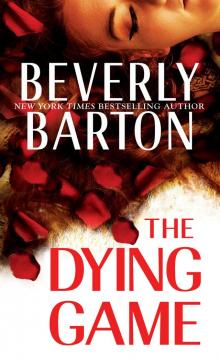 The Dying Game
The Dying Game Dangerous Deception
Dangerous Deception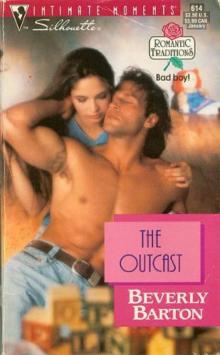 The Outcast tp-3
The Outcast tp-3 Beverly Barton Bundle
Beverly Barton Bundle Egan Cassidy's Kid
Egan Cassidy's Kid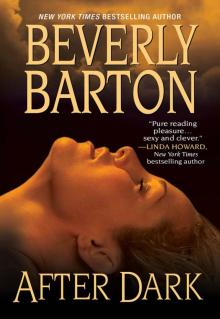 After Dark
After Dark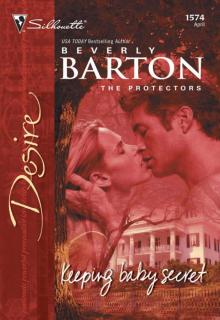 Keeping Baby Secret
Keeping Baby Secret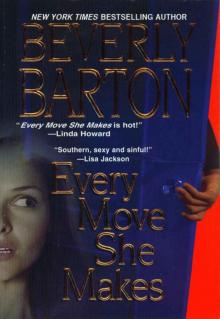 Every Move She Makes
Every Move She Makes Dead By Nightfall
Dead By Nightfall As Good As Dead (Griffin Powell Book 4)
As Good As Dead (Griffin Powell Book 4)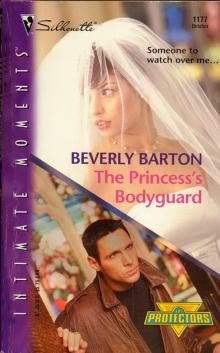 The Princess's Bodyguard
The Princess's Bodyguard JACK'S CHRISTMAS MISSION
JACK'S CHRISTMAS MISSION In the Arms of a Hero
In the Arms of a Hero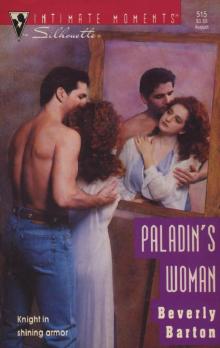 PALADIN'S WOMAN
PALADIN'S WOMAN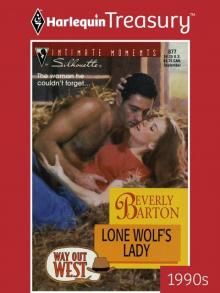 Lone Wolf's Lady
Lone Wolf's Lady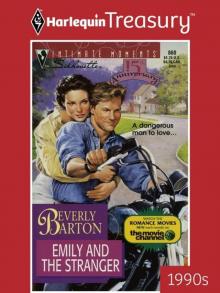 Emily And The Stranger
Emily And The Stranger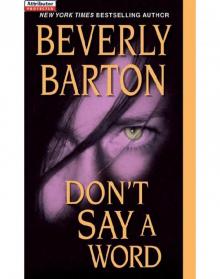 Don't Say a Word
Don't Say a Word LAYING HIS CLAIM
LAYING HIS CLAIM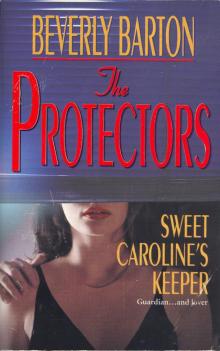 Sweet Caroline's Keeper
Sweet Caroline's Keeper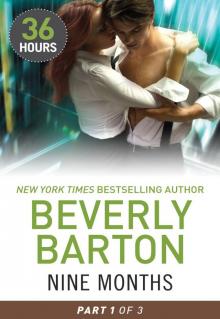 Nine Months Part 1 (36 Hours)
Nine Months Part 1 (36 Hours)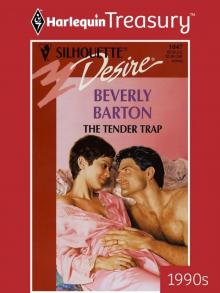 The Tender Trap
The Tender Trap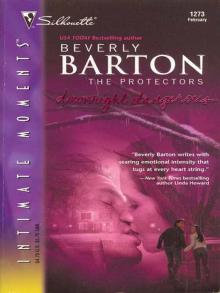 Downright Dangerous
Downright Dangerous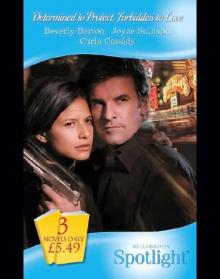 Determined to Protect, Forbidden to Love
Determined to Protect, Forbidden to Love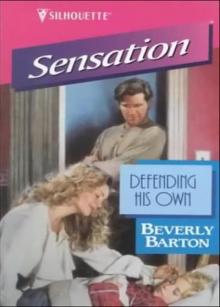 DEFENDING HIS OWN
DEFENDING HIS OWN Lone Star Country Club: The Debutantes
Lone Star Country Club: The Debutantes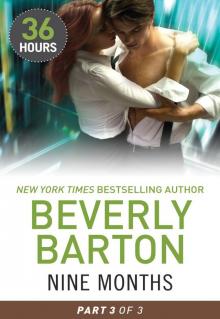 Nine Months Part 3 (36 Hours)
Nine Months Part 3 (36 Hours) Coldhearted
Coldhearted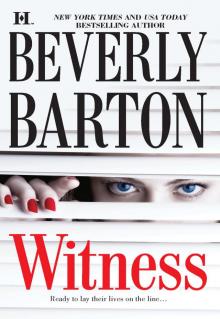 Witness
Witness Navajo's Woman
Navajo's Woman GABRIEL HAWK'S LADY
GABRIEL HAWK'S LADY Faith, Hope and Love
Faith, Hope and Love 12 Stocking Stuffers
12 Stocking Stuffers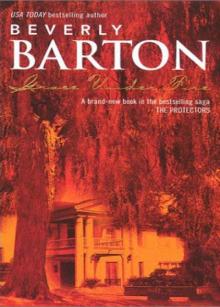 Grace Under Fire
Grace Under Fire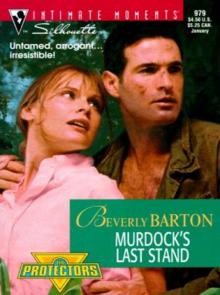 MURDOCK'S LAST STAND
MURDOCK'S LAST STAND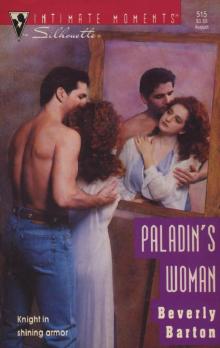 Paladin's Woman tp-2
Paladin's Woman tp-2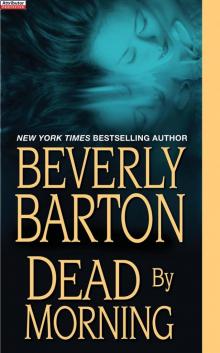 Dead By Morning
Dead By Morning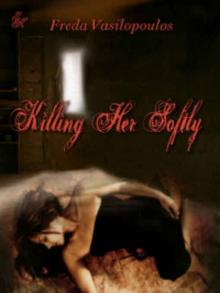 Killing Her Softly
Killing Her Softly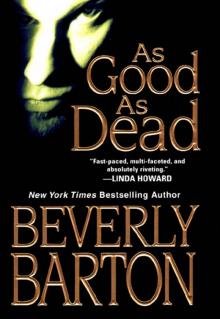 As Good as Dead
As Good as Dead Amnesia
Amnesia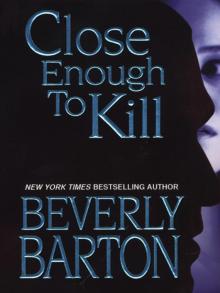 Close Enough to Kill
Close Enough to Kill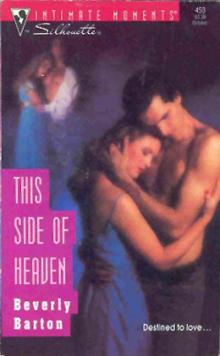 This Side of Heaven tp-1
This Side of Heaven tp-1 Her Secret Weapon
Her Secret Weapon His Only Obsession (Protectors #27)
His Only Obsession (Protectors #27)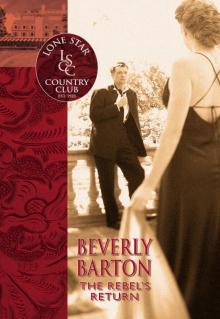 The Rebel's Return
The Rebel's Return The Fifth Victim
The Fifth Victim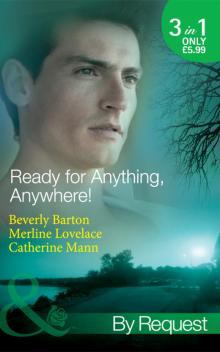 Ready for Anything, Anywhere!
Ready for Anything, Anywhere!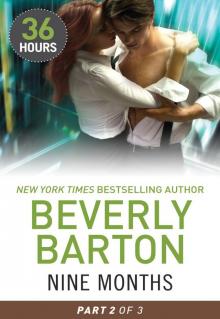 Nine Months Part 2 (36 Hours)
Nine Months Part 2 (36 Hours) A Child of Her Own
A Child of Her Own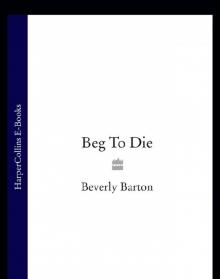 Beg to Die
Beg to Die Raintree: Santuary
Raintree: Santuary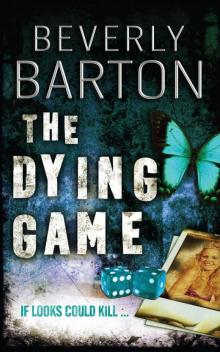 Beverly Barton 3 Book Bundle
Beverly Barton 3 Book Bundle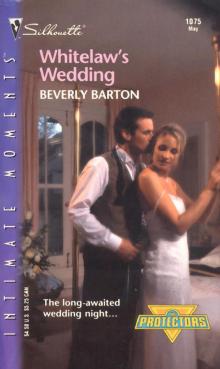 WHITELAW'S WEDDING
WHITELAW'S WEDDING What She Doesn't Know
What She Doesn't Know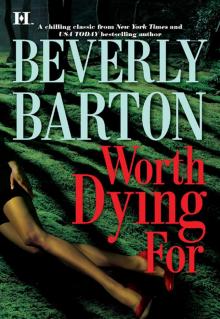 Worth Dying For
Worth Dying For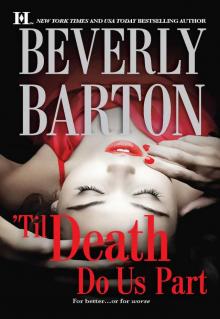 Til Death Do Us Part
Til Death Do Us Part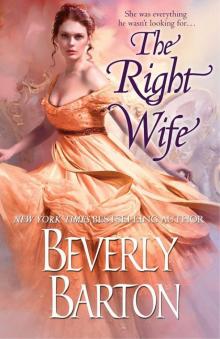 The Right Wife
The Right Wife His Only Obsession (Protectors Book 27)
His Only Obsession (Protectors Book 27)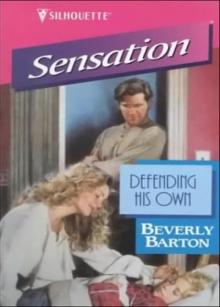 Defending His Own tp-4
Defending His Own tp-4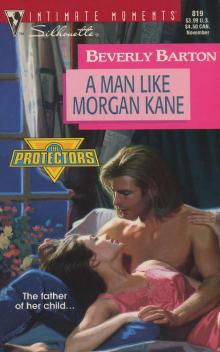 A MAN LIKE MORGAN KANE
A MAN LIKE MORGAN KANE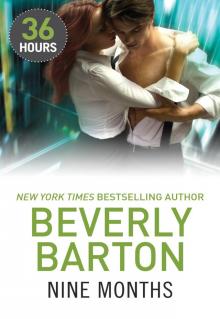 Nine Months
Nine Months If Looks Could Kill
If Looks Could Kill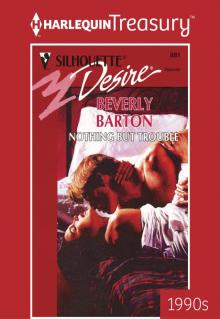 Nothing but Trouble
Nothing but Trouble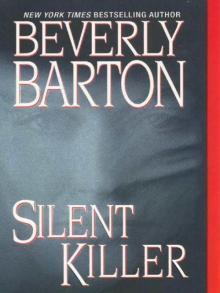 Silent Killer
Silent Killer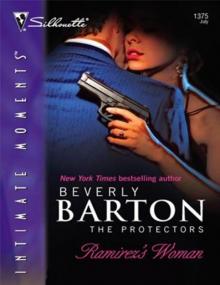 RAMIREZ'S WOMAN
RAMIREZ'S WOMAN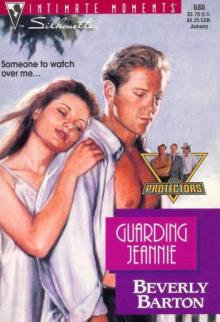 Guarding Jeannie tp-5
Guarding Jeannie tp-5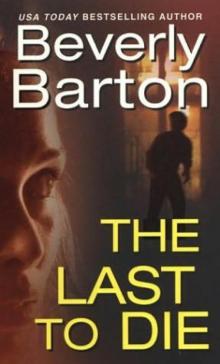 The Last To Die
The Last To Die